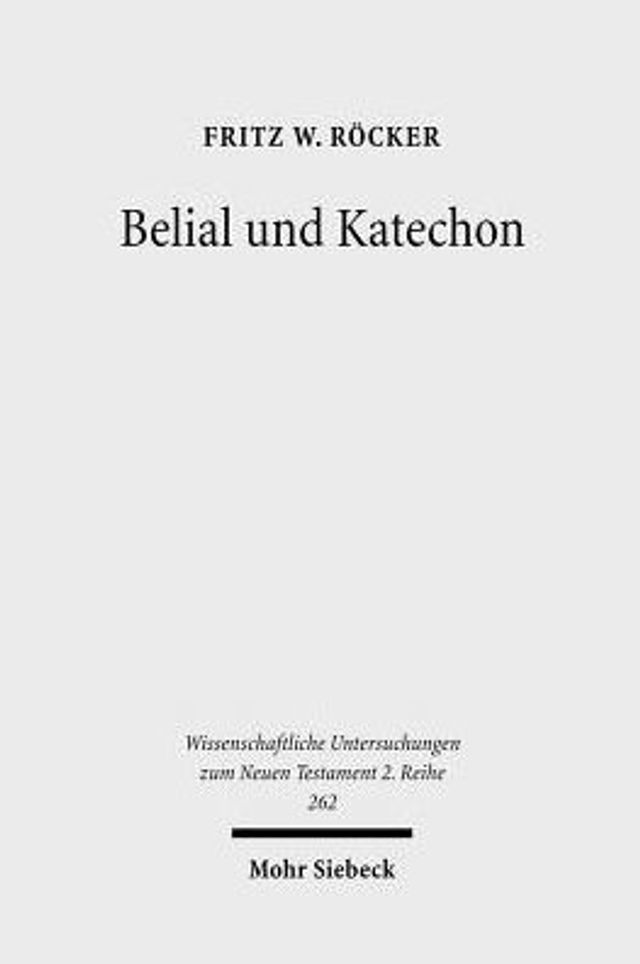Home
Belial und Katechon: Eine Untersuchung zu 2Thess 2,1-12 und 1Thess 4,13-5,11
Loading Inventory...
Barnes and Noble
Belial und Katechon: Eine Untersuchung zu 2Thess 2,1-12 und 1Thess 4,13-5,11
Current price: $149.00


Barnes and Noble
Belial und Katechon: Eine Untersuchung zu 2Thess 2,1-12 und 1Thess 4,13-5,11
Current price: $149.00
Loading Inventory...
Size: OS
*Product Information may vary - to confirm product availability, pricing, and additional information please contact Barnes and Noble
English summary: In his thesis on the eschatological sections of 1 Thess 4:13-5:11 and 2 Thess 2:1-12, Fritz W. Rocker deals with the issue of identifying the traditio-historical origins of the expression the man of lawlessness (2 Thess 2:3) and the lawless one (2 Thess 2:8). He shows that the term Belial is associated with attributes which are inherent to the Greek lexical cluster lawlessness, both in the Old Testament and in Qumran, as well as in the Old Testament's pseudephigrapha and in the New Testament. The thesis also deals with the issue of identifying early Christian traditions on which the eschatological concepts of the letters to the Thessalonians are supposedly based. The author demonstrates that the tradition on which Mt 24 is based is also fundamental to the letters to the Thessalonians. The Katechon (in its masculine and neuter form) is identified as the one who proclaims the Gospel / the gospel itself. German description: Zwei Fragen bilden den Kern der vorliegenden traditionsgeschichtlichen Untersuchung uber die eschatologischen Vorstellungen in den beiden Thessalonicherbriefen (1Thess 4,13-5,11 und 2Thess 2,1-12): die traditionsgeschichtliche Herkunft der Bezeichnung 'der Mensch der Gesetzlosigkeit' (2Thess 2,3) / e'der Gesetzlose' (2Thess 2,8) und die Frage nach urchristlichen Uberlieferungen, die den eschatologischen Vorstellungen aus beiden Thessalonicherbriefen nahe stehen konnten.In Bezug auf die traditionsgeschichtliche Herkunft des 'Menschen der Gesetzlosigkeit' zeigt Fritz W. Rocker, dass der Begriff 'Belial' mit 'Gesetzlosigkeit''/ 'Gesetzloser' wiedergegeben wurde. Belial bezeichnet im Alten Testament, in 'Qumran', den atl. Pseudepigraphen und im Neuen Testament stets Sachverhalte oder Personen, die gegen Gottes Gesetz oder gegen Gott gerichtet sind. Zudem ist der Begriff nahezu uberall mythisch konnotiert. Als nachstliegende urchristliche Uberlieferung, die den eschatologischen Vorstellungen aus den Thessalonicherbriefen zugrunde liegen konnte, hat sich die Uberlieferung, die in Mt 24 aufgenommen ist, herauskristallisieren lassen. Aufgrund der Nahe, die diese Texte zueinander aufweisen, ist es wahrscheinlich, dass der 2Thess den 1Thess mit seinen Ausfuhrungen auf dem Hintergrund einer Uberlieferung, wie sie auch Mt 24 vorgelegen hatte, erganzen bzw. fortsetzen will. Die Naherwartung der Parusie im 1Thess und die Vorstellung von der Verzogerung derselben im 2Thess werden jeweils als Reaktionen verstanden, die auf unterschiedliche Fragen in der Gemeinde von Thessaloniki zuruckzufuhren sind. Der/das Katechon durfte am ehesten mit dem Verkundiger des Evangeliums / dem Evangelium zu identifizieren sein.


















